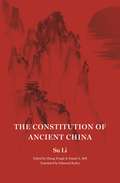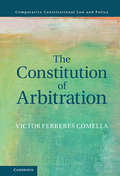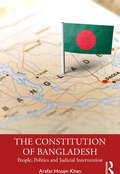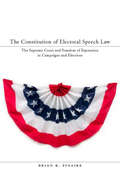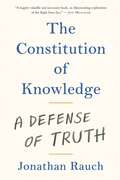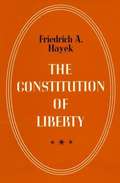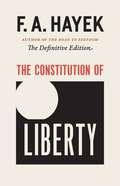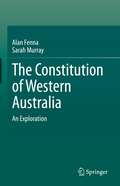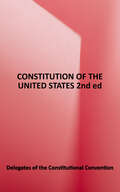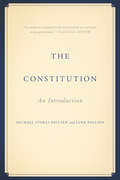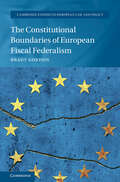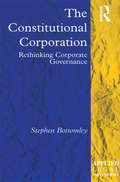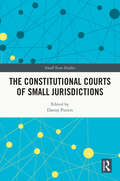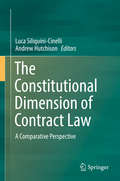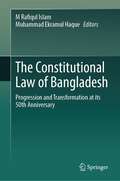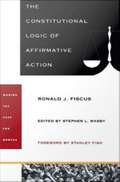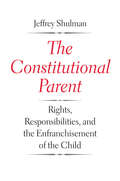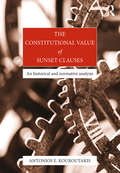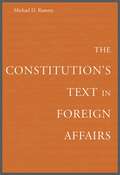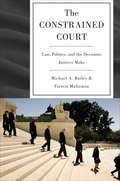- Table View
- List View
The Constitution of Ancient China (The Princeton-China Series)
by Daniel A. Bell Edmund Ryden Su Su Li Zhang YongleHow was the vast ancient Chinese empire brought together and effectively ruled? What are the historical origins of the resilience of contemporary China's political system? In The Constitution of Ancient China, Su Li, China's most influential legal theorist, examines the ways in which a series of fundamental institutions, rather than a supreme legal code upholding the laws of the land, evolved and coalesced into an effective constitution.Arguing that a constitution is an institutional response to a set of issues particular to a specific society, Su Li demonstrates how China unified a vast territory, diverse cultures, and elites from different backgrounds into a whole. He delves into such areas as uniform weights and measurements, the standardization of Chinese characters, and the building of the Great Wall. The book includes commentaries by four leading Chinese scholars in law, philosophy, and intellectual history--Wang Hui, Liu Han, Wu Fei, and Zhao Xiaoli—who share Su Li's ambition to explain the resilience of ancient China's political system but who contend that he overstates functionalist dimensions while downplaying the symbolic. Exploring why China has endured as one political entity for over two thousand years, The Constitution of Ancient China will be essential reading for anyone interested in understanding the institutional legacy of the Chinese empire.
The Constitution of Arbitration (Comparative Constitutional Law and Policy)
by Victor Ferreres ComellaThis work is the first systematic discussion of arbitration from a constitutional perspective, covering the most important types of arbitration, including domestic arbitration in private law, international commercial arbitration, investment treaty arbitration, and state-to-state arbitration. Victor Ferreres Comella argues for the recognition of a constitutional right to arbitration in the private sphere and discusses the constraints that the state is entitled to place on this right. He also explores the conditions under which investment treaty arbitration is constitutionally legitimate, and highlights the shortcomings of international adjudication from a constitutional perspective. The rich landscape of arbitration is explained in clear language, avoiding unnecessary technical jargon. Using examples drawn from a wide variety of domains, Ferreres bridges the gap between constitutional and arbitral theory.
The Constitution of Bangladesh: People, Politics and Judicial Intervention
by Arafat Hosen KhanThe book provides a comprehensive introduction to the Constitution of Bangladesh. It traces the sociopolitical and legal context of its birth in the aftermath of a violent Independence War, through to the seventeen amendments to date as Bangladesh evolved through military coups and dictatorships, shifting alliances between religious and political parties, and the emergence of development state. Aimed at readers who are keen to understand the underpinnings of the constitutional system, its evolution, and the politics behind the scenes, the book will explore the impact of political bargains and extra-legal developments on the evolution of the Constitution instead of treating it as a standalone doctrine. By focusing on the overall sociopolitical context up until 2020, the book departs from the dominant tendency in legal scholarship to restrict attention to the development of the Constitution from its inception to the modern day. The volume will be of great interest to scholars and researchers of law, politics and South Asian studies.
The Constitution of Electoral Speech Law: The Supreme Court and Freedom of Expression in Campaigns and Elections
by Brian PinaireBush v. Gore brought to the public's attention the significance of election law and the United States Supreme Court's role in structuring the rules that govern how campaigns and elections function in America. In this book, Brian K. Pinaire examines one expanding domain within this larger legal context: freedom of speech in the political process, or, what he terms, electoral speech law. Specifically, Pinaire examines the Court's evolving conceptions of free speech in the electoral process and then traces the consequences of various debates and determinations from the post-World War II era to the present. In his analysis of the broad range of cases from this period, supplemented by four recent case study investigations, Pinaire explores competing visions of electoral expression in the marketplace of ideas, various methods for analyzing speech dilemmas, the multiple influences that shape the justices' notions of both the potential for and privileged status of electoral communication, and the ultimate implications of these Court rulings for American democracy.
The Constitution of Knowledge: A Defense of Truth
by Jonathan Rauch“In what could be the timeliest book of the year, Rauch aims to arm his readers to engage with reason in an age of illiberalism.” —Newsweek A New York Times Book Review Editors' Choice Disinformation. Trolling. Conspiracies. Social media pile-ons. Campus intolerance. On the surface, these recent additions to our daily vocabulary appear to have little in common. But together, they are driving an epistemic crisis: a multi-front challenge to America’s ability to distinguish fact from fiction and elevate truth above falsehood. In 2016 Russian trolls and bots nearly drowned the truth in a flood of fake news and conspiracy theories, and Donald Trump and his troll armies continued to do the same. Social media companies struggled to keep up with a flood of falsehoods, and too often didn’t even seem to try. Experts and some public officials began wondering if society was losing its grip on truth itself. Meanwhile, another new phenomenon appeared: “cancel culture.” At the push of a button, those armed with a cellphone could gang up by the thousands on anyone who ran afoul of their sanctimony. In this pathbreaking book, Jonathan Rauch reaches back to the parallel eighteenth-century developments of liberal democracy and science to explain what he calls the “Constitution of Knowledge”—our social system for turning disagreement into truth. By explicating the Constitution of Knowledge and probing the war on reality, Rauch arms defenders of truth with a clearer understanding of what they must protect, why they must do—and how they can do it. His book is a sweeping and readable description of how every American can help defend objective truth and free inquiry from threats as far away as Russia and as close as the cellphone.
The Constitution of Liberty
by Friedrich A. HayekIn this classic work Hayek restates the ideals of freedom that he believes have guided, and must continue to guide, the growth of Western civilization. Hayek's book, first published in 1960, urges us to clarify our beliefs in today's struggle of political ideologies.
The Constitution of Liberty: The Definitive Edition
by Friedrich A. Hayek edited by Ronald HamowyFrom the $700 billion bailout of the banking industry to president Barack Obama's $787 billion stimulus package to the highly controversial passage of federal health-care reform, conservatives and concerned citizens alike have grown increasingly fearful of big government. Enter Nobel Prize-winning economist and political theorist F. A. Hayek, whose passionate warning against empowering states with greater economic control, The Road to Serfdom, became an overnight sensation last summer when it was endorsed by Glenn Beck. The book has since sold over 150,000 copies. The latest entry in the University of Chicago Press's series of newly edited editions of Hayek's works, The Constitution of Liberty is, like Serfdom, just as relevant to our present moment. The book is considered Hayek's classic statement on the ideals of freedom and liberty, ideals that he believes have guided--and must continue to guide--the growth of Western civilization. Here Hayek defends the principles of a free society, casting a skeptical eye on the growth of the welfare state and examining the challenges to freedom posed by an ever expanding government--as well as its corrosive effect on the creation, preservation, and utilization of knowledge. In opposition to those who call for the state to play a greater role in society, Hayek puts forward a nuanced argument for prudence. Guided by this quality, he elegantly demonstrates that a free market system in a democratic polity--under the rule of law and with strong constitutional protections of individual rights--represents the best chance for the continuing existence of liberty. Striking a balance between skepticism and hope, Hayek's profound insights are timelier and more welcome than ever before. This definitive edition of The Constitution of Liberty will give a new generation the opportunity to learn from his enduring wisdom.
The Constitution of Risk
by Adrian VermeuleThe Constitution of Risk is the first book to combine constitutional theory with the theory of risk regulation. The book argues that constitutional rulemaking is best understood as a means of managing political risks. Constitutional law structures and regulates the risks that arise in and from political life, such as an executive coup or military putsch, political abuse of ideological or ethnic minorities, or corrupt self-dealing by officials. The book claims that the best way to manage political risks is an approach it calls "optimizing constitutionalism" - in contrast to the worst-case thinking that underpins "precautionary constitutionalism," a mainstay of liberal constitutional theory. Drawing on a broad range of disciplines such as decision theory, game theory, welfare economics, political science, and psychology, this book advocates constitutional rulemaking undertaken in a spirit of welfare maximization, and offers a corrective to the pervasive and frequently irrational attitude of distrust of official power that is so prominent in American constitutional history and discourse.
The Constitution of Western Australia: An Exploration
by Sarah Murray Alan FennaThis book provides the first comprehensive introduction to, and enquiry into, the rules of Western Australia’s (WA) system of government. The WA Constitution is not well known or understood ― or even easy to identify ― and this book provides an essential guide. It brings academic expertise and careful scholarship to the exploration of sometimes complex constitutional issues in a way that will be invaluable for those with specialist interest in constitutional law and government while also being engaging and accessible for a wider audience. In doing so, it combines authorial expertise from constitutional law and political science — something essential to a well-rounded understanding of the simultaneously legal and political nature of a Constitution.
The Constitution of the Commonwealth of Australia
by Nicholas Aroney Nicholas Aroney Peter Gerangelos Sarah Murray James Stellios Peter Gerangelos Sarah MurrayThe Constitution of the Commonwealth of Australia examines the body of constitutional jurisprudence in an original and rigorous yet accessible way. It begins by exploring the historical and intellectual context of ideas surrounding the Constitution's inception, and closely examines its text, structure, principles and purposes in that light. The book then unpacks and critically analyses the High Court's interpretation of the Constitution in a manner that follows the Constitution's own logic and method of organisation. Each topic is defined through detailed reference to the existing case law, which is set out historically to facilitate an appreciation of the progressive development of constitutional doctrine since the Constitution came into force in 1901. The Constitution of the Commonwealth of Australia provides an engaging and distinctive treatment of this fundamental area of law. It is an excellent book for anyone seeking to understand the significance and interpretation of the Constitution.
The Constitution of the United States
by William Baude Michael Paulsen Michael McConnell Samuel BrayThis casebook emphasizes the text, structure, and history of the Constitution. It uses "great cases" for learning the major issues in constitutional law, and it gives less attention to small ripples of contemporary doctrine. It emphasizes the task of interpretation, including many examples of the interpretation of the Constitution by the political branches. And it includes features of our constitutional history that are neglected in many casebooks, such as slavery, the amendment process, and the early history of the freedom of speech. The fourth edition has many refinements. It also has new cases on (among other topics) the non-delegation doctrine, legislative investigations, presidential removal, compelled speech, and the free exercise of religion, and new old cases on Article III and on the commerce power. There are also new executive and legislative materials on various topics, including impeachment and the drafting of the Bill of Rights.
The Constitution of the United States: With Index, and the Declaration of Independence
by Delegates of the Constitutional ConventionThe Constitution of the United States, with Index, and The Declaration of Independence: Pocket Edition This Constitution was proofed word for word against the original Constitution housed in the Archives in Washington, D.C. It is identical in spelling, capitalization, and punctuation. It is sized in accordance with one produced by President Thomas Jefferson and includes the Bill of Rights, Amendments 11 through 27, The Declaration of Independence and a complete index of the Constitution. 52 pages. 3-1/4 x 6-1/2 inches. Published by the National Center for Constitutional Studies, a nonprofit educational foundation dedicated to restoring Constitutional principles in the tradition of America's Founding Fathers.
The Constitution: An Introduction
by Luke Paulsen Michael PaulsenFrom war powers to health care, freedom of speech to gun ownership, religious liberty to abortion, practically every aspect of American life is shaped by the Constitution. This vital document, along with its history of political and judicial interpretation, governs our individual lives and the life of our nation. Yet most of us know surprisingly little about the Constitution itself, and are woefully unprepared to think for ourselves about recent developments in its long and storied history.The Constitution: An Introduction is the definitive modern primer on the US Constitution. Michael Stokes Paulsen, one of the nation's most provocative and accomplished scholars of the Constitution, and his son Luke Paulsen, a gifted young writer and lay scholar, have combined to write a lively introduction to the supreme law of the United States, covering the Constitution's history and meaning in clear, accessible terms.Beginning with the Constitution's birth in 1787, Paulsen and Paulsen offer a grand tour of its provisions, principles, and interpretation, introducing readers to the characters and controversies that have shaped the Constitution in the 200-plus years since its creation. Along the way, the authors provide correctives to the shallow myths and partial truths that pervade so much popular treatment of the Constitution, from school textbooks to media accounts of today's controversies, and offer powerful insights into the Constitution's true meaning.A lucid and engaging guide, The Constitution: An Introduction provides readers with the tools to think critically and independently about constitutional issues-a skill that is ever more essential to the continued flourishing of American democracy.
The Constitution: Our Written Legacy
by Joseph A. MeluskyHelps students study constitutional principles, issues, and applications in some depth, and to better understand the importance of the document in contemporary times, this book contains excerpts from the Federalist Papers, some landmark Supreme Court opinions, and the texts of some important documents including the Magna Carta, the Declaration of Independence, the Bill of Rights, and others.
The Constitutional Boundaries of European Fiscal Federalism (Cambridge Studies in European Law and Policy)
by Brady GordonThis book bridges the study of European constitutionalism with the study of 'fiscal federalism' – the subfield of public economics concerned with structuring public finances between different levels of government in federal states. On one axis, this book delves into European Union and Member State constitutional law from all EU Member States in order to investigate and identify the existence of permanent constitutional boundaries that will impinge upon the selection of proposed models for EU fiscal federalism. On the second axis, this book engages the study of fiscal federalism in order to determine which institutional configurations known to that field remain legally and economically implementable within those boundaries. It provides a far-reaching investigation of which models of fiscal federalism are compatible with the constitutional boundaries of the European legal order.
The Constitutional Corporation: Rethinking Corporate Governance (Applied Legal Philosophy)
by Stephen BottomleyCorporate laws are based on the idea that the interests of shareholders should be the primary concern of company directors. However, some argue that the proper role for shareholders is to sit back and let the corporation's managers do their job, or that the pursuit of shareholders' interests detracts from the concerns of employees or victims of corporate wrongdoing or other stakeholders. Stephen Bottomley argues that instead of consigning shareholders to this passive role, they should be given opportunities to be active members of corporations. Corporations are constitutional arrangements rather than mere contractual agreements. They are decision-making organizations in which questions of process and structure are important. Thus, instead of using economic criteria such as efficiency as the sole measure for deciding what constitutes 'good' corporate governance, this book examines whether ideas of accountability, deliberation and contestability provide a valuable framework for assessing corporate structures and process and for encouraging greater shareholder participation.
The Constitutional Courts of Small Jurisdictions (Small State Studies)
by Danny PietersThe Constitutional Courts of Small Jurisdictions identifies features and challenges common to the constitutional courts of small state jurisdictions in Europe.The constitutional courts of the following small state jurisdictions are explored: Andorra, Cyprus, Estonia, Liechtenstein, Luxembourg, Malta, Monaco, Montenegro, and San Marino. For each country’s constitutional court, the following matters are examined: the history of the court; its composition; its standing and the types of proceedings; jurisdiction of the court; procedural steps and rules; the nature and effect of the decisions rendered; relations with other courts (CJEU, ECHR, etc.); and current issues and future developments. The book concludes by identifying some common features and challenges that constitutional courts of small states are confronted with, formulating recommendations for other small state jurisdictions across the world.This book will be of great interest and use to practitioners and scholars working in and researching constitutional law in general, and constitutional courts in particular. It will be invaluable for those dealing with small states, as it pays attention to an often forgotten - but important - aspect of the rule of law, and thus also of democracy.
The Constitutional Dimension of Contract Law
by Luca Siliquini-Cinelli Andrew HutchisonDelving into the interplay between human rights policies, constitutional law, and contract law from both theoretical and practical perspectives, this book offers a totally new reappraisal of the subject by gathering a collection of essays written by comparative and contract law scholars from Europe, Africa, Asia, Canada, and Australia. Instead of providing the reader with a sterile compilation of positivistic norms and policies on the impact of fundamental (human) rights and constitutional law issues on contract law's development, the authors build on their personal experience to analyse specific topics related to contracting which include a constitutional dimension. The book fills an important void in comparative law scholarship in so representing the starting point for further debate on the subject. One of the hallmarks of the present era is the discourse surrounding human rights and the necessity that the law take cognisance of these. Various national and supranational human rights instruments have been developed and implemented in order to transition society away from atrocity and callousness toward a more just and inclusive future. In some countries this is done through the mechanism of a supreme Constitution, while in others international conventions or ordinary legislation hold sway. Contract law plays a pivotal role in this phenomenon. This is done through the debated 'civilising mission' of the contract, a notion which itself constitutes the canon of the Western liberal principle of 'civilised economy'. The movement from the belief in the absolute freedom of contract which characterised socio-legal thought in the eighteen century, to the principles of fairness and justice which underpin the law of contract today is testament to this.
The Constitutional Law of Bangladesh: Progression and Transformation at its 50th Anniversary
by M Rafiqul Islam Muhammad Ekramul HaqueThis book provides a supportive lending hand to researchers of constitutional law worldwide about the constitutional law of Bangladesh. Moreover, this book discusses the evolution and development of the constitutional law of Bangladesh over 50 years from its embryonic stage with reference to comparative constitutional law. This book is a very useful resource for the comparative constitutional researchers as readers will be able to easily interpret the constitutional law of Bangladesh from national, regional and global constitutional law perspectives.This book celebrates the fiftieth anniversary of the Constitution, the first of its kind to portray the journey of constitutionalism in Bangladesh comprehensively with intellectual observations and palatable recommendations for improvement. This book looks back to the constituent assembly debates, intention of the constitution makers and how have those dreams and aspirations have come into realities, what goals have been achieved, what caused some failures, and what should be its future directions. At such a momentous point in history, it is imperative that its native and foreign constitutional authoritative voices scholarly assess the constitutional design, understand the reasons for its successes and occasional failures, and ventilate their views towards its progressive development to elevate it to a new height in the 21st century and beyond.The book chapters discuss not only the text of the constitution and some judicial precedents, rather involve in a much larger task of unveiling the interpretative approach of the Constitution from a comparative constitutional law perspective. This book shall project the future roadmap for the journey of constitutionalism in Bangladesh throughout all chapters offering policy recommendations for the revision of the Constitution.
The Constitutional Logic of Affirmative Action
by Ronald J. FiscusFew issues are as mired in rhetoric and controversy as affirmative action. This is certainly no less true now as when Ronald J. Fiscus's The Constitutional Logic of Affirmative Action was first published in 1992. The controversy has, perhaps, become more charged over the past few years. With this compelling and rigorously reasoned argument for a constitutional rationale of affirmative action, Fiscus clarifies the moral and legal ramifications of this complex subject and presents an important view in the context of the ongoing debate. Beginning with a distinction drawn between principles of compensatory and distributive justice, Fiscus argues that the former, although often the basis for judgments made in individual discrimination cases, cannot sufficiently justify broad programs of affirmative action. Only a theory of distributive justice, one that assumes minorities have a right to what they would have gained proportionally in a nonracist society, can persuasively provide that justification. On this basis, the author argues in favor of proportional racial quotas--and challenges the charge of "reverse discrimination" raised in protest in the name of the "innocent victims" of affirmative action--as an action necessary to approach the goals of fairness and equality. The Constitutional Logic of Affirmative Action focuses on Supreme Court affirmative action rulings from Bakke (1976) to Croson (1989) and includes an epilogue by editor Stephen L. Wasby that considers developments through 1995. General readers concerned with racial justice, affirmative action, and public policy, as well as legal specialists and constitutional scholars will find Fiscus's argument passionate, balanced, and persuasive.
The Constitutional Parent
by Jeffrey ShulmanIn this bold and timely work, law professor Jeffrey Shulman argues that the United States Constitution does not protect a fundamental right to parent. Based on a rigorous reconsideration of the historical record, Shulman challenges the notion, held by academics and the general public alike, that parental rights have a long-standing legal pedigree. What is deeply rooted in our legal tradition and social conscience, Shulman demonstrates, is the idea that the state entrusts parents with custody of the child, and it does so only as long as parents meet their fiduciary duty to serve the developmental needs of the child. Shulman’s illuminating account of American legal history is of more than academic interest If once again we treat parenting as a delegated responsibility#151;as a sacred trust, not a sacred right#151;we will not all reach the same legal prescriptions, but we might be more willing to consider how time-honored principles of family law can effectively accommodate the evolving interests of parent, child, and state.
The Constitutional Protection of Private Property in China
by Chuanhui WangThis timely book reviews the changes in legal reform around the constitutional protection of private property in China since 1949. Using a comparative approach, it analyses the development of property theories and the various constitutionalisation models and practices of private property in representative countries including the United States, Canada, Germany, India and China. It also explores the interwoven social forces that have been driving the evolution of the constitutional protection of private property in China. By comparing China with the United States, Germany and India, the author reveals the unfairness, unjustness and insufficiency in China's application of three constitutional doctrines – public use, just compensation and due process or procedure. The book concludes by predicting future progress and suggests feasible measures for gradual reform that will be compatible with China's existing political system.
The Constitutional Value of Sunset Clauses: An historical and normative analysis
by Antonios Emmanouil KouroutakisIn recent years, sunset clauses have mostly been associated with emergency legislation introduced in the wake of terrorist attacks. However, as this book demonstrates, they have a long history and a substantial constitutional impact on the separation of powers and the rule of law. In addition, the constitutional value of such clauses is examined from certain neglected normative aspects pertaining to concepts such as deliberative and consensus democracy, parliamentary sovereignty and constitutional dialogue. The work is an amalgam of three perspectives: the historical, the positive and the normative. All three are intertwined and each subsequent part builds upon the findings of the previous one. The historical perspective investigates the historical development of sunset clauses since the first Parliaments in England. The positive perspective examines the legal effect and the contemporary utility of sunset clauses. Finally, the normative perspective analyses their interaction with several models of separation of powers, and their influence on the dialogue between various institutions as it values their impact on the rule of law, formal and substantive. The detailed examination of this topical subject will be a valuable resource for academics, researchers and policy makers.
The Constitution’s Text in Foreign Affairs
by Michael D. RamseyThis book describes the constitutional law of foreign affairs, derived from the historical understanding of the Constitution's text. It examines timeless and recurring foreign affairs controversies--such as the role of the president and Congress, the power to enter armed conflict, and the power to make and break treaties--and shows how the words, structure, and context of the Constitution can resolve pivotal court cases and leading modern disputes. The book provides a counterpoint to much conventional discussion of constitutional foreign affairs law, which tends to assume that the Constitution's text and history cannot give much guidance, and which rests many of its arguments upon modern practice and policy considerations.Using a close focus on the text and a wide array of historical sources, Michael Ramsey argues that the Constitution's original design gives the president substantial independent powers in foreign affairs. But, contrary to what many presidents and presidential advisors contend, these powers are balanced by the independent powers given to Congress, the Senate, the states, and the courts. The Constitution, Ramsey concludes, does not make any branch of government the ultimate decision maker in foreign affairs, but rather divides authority among multiple independent power centers.
The Constrained Court: Law, Politics, and the Decisions Justices Make
by Forrest Maltzman Michael A. BaileyHow do Supreme Court justices decide their cases? Do they follow their policy preferences? Or are they constrained by the law and by other political actors? The Constrained Court combines new theoretical insights and extensive data analysis to show that law and politics together shape the behavior of justices on the Supreme Court. Michael Bailey and Forrest Maltzman show how two types of constraints have influenced the decision making of the modern Court. First, Bailey and Maltzman document that important legal doctrines, such as respect for precedents, have influenced every justice since 1950. The authors find considerable variation in how these doctrines affect each justice, variation due in part to the differing experiences justices have brought to the bench. Second, Bailey and Maltzman show that justices are constrained by political factors. Justices are not isolated from what happens in the legislative and executive branches, and instead respond in predictable ways to changes in the preferences of Congress and the president. The Constrained Court shatters the myth that justices are unconstrained actors who pursue their personal policy preferences at all costs. By showing how law and politics interact in the construction of American law, this book sheds new light on the unique role that the Supreme Court plays in the constitutional order.
